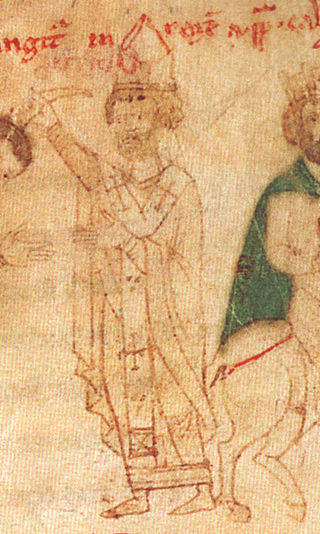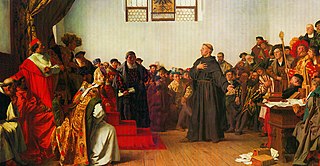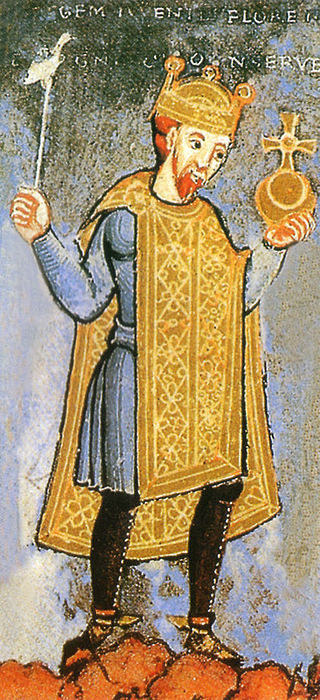
The Concordat of Worms was an agreement between the Catholic Church and the Holy Roman Empire which regulated the procedure for the appointment of bishops and abbots in the Empire. Signed on 23 September 1122 in the German city of Worms by Pope Callixtus II and Emperor Henry V, the agreement set an end to the Investiture Controversy, a conflict between state and church over the right to appoint religious office holders that had begun in the middle of the 11th century.
The First Council of the Lateran was the 9th ecumenical council recognized by the Catholic Church. It was convoked by Pope Callixtus II in December 1122, immediately after the Concordat of Worms. The council sought to bring an end to the practice of the conferring of ecclesiastical benefices by people who were laymen, free the election of bishops and abbots from secular influence, clarify the separation of spiritual and temporal affairs, re-establish the principle that spiritual authority resides solely in the Church and abolish the claim of the Holy Roman Emperor to influence papal elections.

Pope Callixtus II or Callistus II, born Guy of Burgundy, was head of the Catholic Church and ruler of the Papal States from 1 February 1119 to his death in 1124. His pontificate was shaped by the Investiture Controversy, which he was able to settle through the Concordat of Worms in 1122.
Reichstag is a German word generally meaning parliament, more directly translated as Diet of the Realm or National Diet, or more loosely as Imperial Diet. It may refer to:

The Salian dynasty or Salic dynasty was a dynasty in the High Middle Ages. The dynasty provided four kings of Germany (1024–1125), all of whom went on to be crowned Holy Roman emperors (1027–1125).
Pope Paschal II, born Ranierius, was head of the Catholic Church and ruler of the Papal States from 13 August 1099 to his death in 1118. A monk of the Abbey of Cluny, he was created the cardinal-priest of San Clemente by Pope Gregory VII (1073–85) in 1073. He was consecrated as pope in succession to Pope Urban II (1088–99) on 19 August 1099. His reign of almost twenty years was exceptionally long for a medieval pope.

The Diet of Worms of 1521 was an imperial diet of the Holy Roman Empire called by Emperor Charles V and conducted in the Imperial Free City of Worms. Martin Luther was summoned to the Diet in order to renounce or reaffirm his views in response to a Papal bull of Pope Leo X. In answer to questioning, he defended these views and refused to recant them. At the end of the Diet, the Emperor issued the Edict of Worms, a decree which condemned Luther as "a notorious heretic" and banned citizens of the Empire from propagating his ideas. Although the Protestant Reformation is usually considered to have begun in 1517, the edict signals the first overt schism.

The Investiture Controversy or Investiture Contest was a conflict between the Church and the state in medieval Europe over the ability to choose and install bishops (investiture) and abbots of monasteries and the pope himself. A series of popes in the 11th and 12th centuries undercut the power of the Holy Roman Emperor and other European monarchies, and the controversy led to nearly 50 years of conflict.

Church and state in medieval Europe was the relationship between the Catholic Church and the various monarchies and other states in Europe during the Middle Ages.
Perpetual Peace or Eternal Peace may refer to:
William I was bishop of Utrecht between 1054 and 1076. He was a typical representative of the German imperial system in which bishops were the main officials of the empire. He was a loyal follower of king Henry IV of Germany. William was appointed when a war was going on against West Frisia, which was resisting imperial authority. The imperial army conquered large parts of West Frisia in 1061, when Dirk V became count. King Henry gave the whole county to the bishopric of Utrecht in 1064. The whole of West Frisia was conquered in 1076 with the help of duke Godfrey III.
Blessed Gebhard von Salzburg, also occasionally known as Gebhard of Sussex, was Archbishop of Salzburg from 1060 until his death. He was one of the fiercest opponents of King Henry IV of Germany during the Investiture Controversy.
Imperial cathedral is the designation for a cathedral linked to the Imperial rule of the Holy Roman Empire.

The history of the papacy from 1046 to 1216 was marked by conflict between popes and the Holy Roman Emperor, most prominently the Investiture Controversy, a dispute over who— pope or emperor— could appoint bishops within the Empire. Henry IV's Walk to Canossa in 1077 to meet Pope Gregory VII (1073–85), although not dispositive within the context of the larger dispute, has become legendary. Although the emperor renounced any right to lay investiture in the Concordat of Worms (1122), the issue would flare up again.

Diet of Worms is an Irish comedy and theatre group based in Dublin, Ireland and London, UK, made up of Rory Connolly, Philippa Dunne, Niall Gaffney, Shane Langan and Amy Stephenson. They write and perform sketch and character comedy for stage and screen.

At the Diet of Wormsin 1495, the foundation stone was laid for a comprehensive reform (Reichsreform) of the Holy Roman Empire. Even though several elements of the reforms agreed by the Imperial Diet (Reichstag) at Worms did not last, they were nevertheless highly significant in the further development of the empire. They were intended to alter its structure and constitutional ordinances in order to resolve the problems of imperial government that had become evident.

The Walshes is an Irish comedy television series that was first broadcast on RTÉ One on 6 March and BBC Four on 13 March 2014. The three-part series was written by Graham Linehan and the comedy group Diet of Worms, and is based on the group's 2010 web series The Taste of Home. The show follows the Walshes, a tight-knit family living in the fictional West Dublin suburb of Strollinstown. Diet of Worms portray the family, reprising their roles from the web series.
This page is based on this
Wikipedia article Text is available under the
CC BY-SA 4.0 license; additional terms may apply.
Images, videos and audio are available under their respective licenses.









